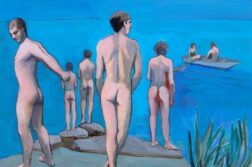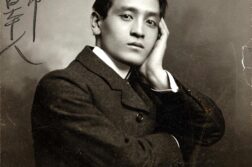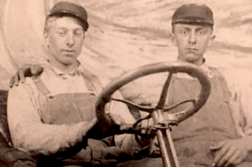IT’S JUST PAST NOON on an April Sunday in Washington, D.C. A friend and I are waiting for a third friend to join us for a bicycle ride along the C&O Canal, just where the towpath begins in Georgetown. In front of us are the remains of an aqueduct that used to carry a segment of the canal across the Potomac to Virginia; all that is left is a beautiful stone arch.
Beyond the arch, in the sunshine, on a grassy slope, on this warm spring day, sits a young man in a baseball cap, taking the sun without his shirt and reading a book. His legs are enclosed in long navy-blue nylon sweatpants with a white stripe running down the sides; his baseball cap is a soft brown; his body is pale, pale white—the pallor accumulated over the course of a winter, a pallor that is not milk-white, or chalk-white, but stone-white, weathered stone, with something both creamy and gray in it. He’s seated with slumped shoulders as he reads his book. The shoulders that catch the sun are well-formed, and the pectoral muscles of his chest, at the moment collapsed, seem small. It is only when he stands up that his body unfolds. It’s one of those torsos that no doubt has been worked on at a gym, yet nothing has been spoiled. For one thing, the arms and shoulders are more muscular than the chest, not vice versa. He has avoided the misfortune of so many gym rats—the destruction of proportion—unless one wants to argue that his arms are a bit too thick. Otherwise, he is a Praxiteles, a Phidias; he is Perfection.
We intend to ride to Great Falls; we’re straddling our bikes in the shade of another bridge, talking as I watch him just through the arch. The book, the bike, the baseball cap. Except for the nylon sweatpants and the cap, he might be a college man who has been training with medicine balls and dumbbells and rings on a spring day in 1892 in one of those old gymnasiums that some universities still have on the east coast. He brings to mind the frustration I felt at his age when I tried to study surrounded by handsome men like him, especially in spring. What did such a body mean—what did it ask for—what was one supposed to do with it?
He raises his head from his book to look in our direction. He stands and removes his baseball cap and runs one hand through his thick brown hair. He walks down toward the river, out of sight, then returns, sits down again and resumes reading. Then he glances up once more. Is he looking down the road that runs along the river or at us?
“Us,” says my friend.
I was going to write an essay today on the difference between being beautiful and being sexy—how the two are not the same. How it can take some of us a long while to learn that beauty is not connected to any other quality in a person—not even goodness or self-esteem. How eventually we learn that what binds us to another person is something more psychological than physical, and therefore how foolish it is to spend so much time on our appearances. How there is a poem by Yeats that contradicts this idea (“Only God can love you for yourself and not your yellow hair”), and how Gerard Manley Hopkins wrote a poem called “To What Serves Mortal Beauty?” How even beauty loses its power over us as we age. How the carnal surrenders its addicting power and desire becomes submerged once again in sentiment. But now the boy in the baseball cap makes all that seem truly academic. “Beauty makes no sense,” I say to my friend in a low, irritated voice.
“What do you mean?” he says.
“I mean in Darwinian terms,” I say. “What’s its function? Let’s say a man desires a beautiful woman because she can give him beautiful children—and beautiful children are presumably healthier and so have a better chance of surviving.”
“In our case that does not apply,” he says.
“But that’s how strong the Life Force is,” I said. “It still makes him mesmerizing. Santayana said every organism aspires to perfection of form. Maybe that’s what it is. He also said beauty was the promise of pleasure, but then he retracted that. Plato says in The Symposium that love is the desire to be born in beauty. But I’ve never understood what that means. What does the desire to be born in beauty mean—to have beautiful children? To be born in beauty? I don’t know.”
The boy by the towpath removes his hat and runs his hand through his hair again.
“Do you remember the Ladder of Love in The Symposium? How we are supposed to move from the real to the ideal—from the specific to the general—to the idea of the good? Is he the ideal or the real?” I say, squinting at the paragon. “The specific or the general? When someone is beautiful as he is, which is it? Am I loving Beauty through him, or am I loving him?”
“You got me,” says my friend.
“I was just reading a poem by Hopkins last night. He says we have to simply meet beauty, whatever that means, and move beyond it to God’s grace, which he calls ‘the better beauty.’ But few people believe that anymore. What’s so odd is that even when you learn there is no relation, none whatsoever, between beauty and character, between beauty and goodness, beauty and any personality trait, or even beauty and good sex, or anything whatsoever, it still has this power. It’s amazing. But then Santayana also said it’s the erotic quality of life that gives it whatever charm it has. So do you think he’s gay?”
“I do,” he says.
Time passes. We continue to look. He glances in our direction. Our friend is late. Other cars pull up. A handsome man gets out and puts on roller blades, and goes skating off, but he cannot compare. Finally the boy in the baseball cap stands up, removes his cap, puts on a sleeveless navy-blue T-shirt and a knapsack. “He’s leaving,” I say, depressed and relieved.
He mounts his bicycle and rides toward us through the shadowed arch into the sunlight and then—instead of riding off—he turns and starts to make circles in the road beside us, as if he cannot go without settling something. “He’s going to beat us up,” I whisper.
“That would not be good,” my friend says.
We continue talking and stare in the direction of the arch, as if he had not been the object of our gaze, while the flip from gay to straight occurs: what was cruising becomes insult, what was admiration becomes sleaze, what was a lovely spring afternoon and a discussion of The Symposium becomes an unpleasant incident beneath a bridge in Georgetown. He continues to make circles in the road. His head is delicate and small, with an aquiline nose; he looks like a sensitive young scholar who wanted muscles too. He appears idealistic, serious, refined. The way he’s circling makes me think he’s also inhibited and shy, and wants to speak to us but doesn’t know how. Then a black Volvo drives up; the boy on the bicycle stops; the car pulls in a few spaces down from us and he walks his bike over to it.
“Now,” I whisper, “we’ll find out. We’ll find out everything we need to know about him just by what gets out of that car.”
The boy on the bicycle goes to the other side of the Volvo to talk to the driver. Then he backs into the road, straddling his bike. He removes his baseball cap and puts it in his knapsack. He looks different without it. His hair, close-up, is crinkled and wavy, the sort that used to be called marcelled; it makes him look like a crooner on a piece of sheet music from the 1920’s, or a young man from Budapest arriving on the White Star line in New York in 1911. He’s more old-fashioned—the small head, the delicate features, the wavy hair, on this massive, muscular body whose only flaw may be that his arms seem to indicate body-building. But who’s complaining? Someone gets out of the Volvo and comes to the rear of the car to take out his bike. He’s a middle-aged man, with thick salt-and-pepper hair, average height, with something of a stomach, dressed in biking gear. The two talk as he gets his bike ready. Are they uncle and nephew, man and brother-in-law, or colleagues in the same office who like to bike? There’s no way of knowing.
“Here’s what I think,” my friend mutters. “They just met in a chat room, agreed to go biking, and he thought one of us was the guy. That’s why he kept looking at us and wouldn’t ride away. Then he recognized the car, and now he’s got the man he was waiting for.”
“That’s good,” I whisper, “that’s very good.”
At least they’ll be biking the same trail we will, I think, and we’ll be able to glimpse him all afternoon, in green and dappled light.
Instead, the two men mount their bicycles and ride off—in the opposite direction, towards town. “Why are they going that way?” I say. “Where do you think they’re going?”
“Back to his apartment to have sex?”
“Then why the bicycles?”
I walk over to the Volvo and peer inside to see what I can learn from the contents about the man the paragon was waiting for; but there’s nothing in it but the impersonal mess of gym clothes and running shoes.
“What are you doing?” says my friend.
“Looking for clues about the guy he rode off with,” I say.
“What’s the Darwinian explanation for that?”
“A little known principle of natural selection,” I say.
“What’s that?” he says.
“Life is cuckoo,” I reply.
Andrew Holleran’s novels include Dancer from the Dance, Nights in Aruba, and The Beauty of Men. He is a frequent contributor to this publication.





